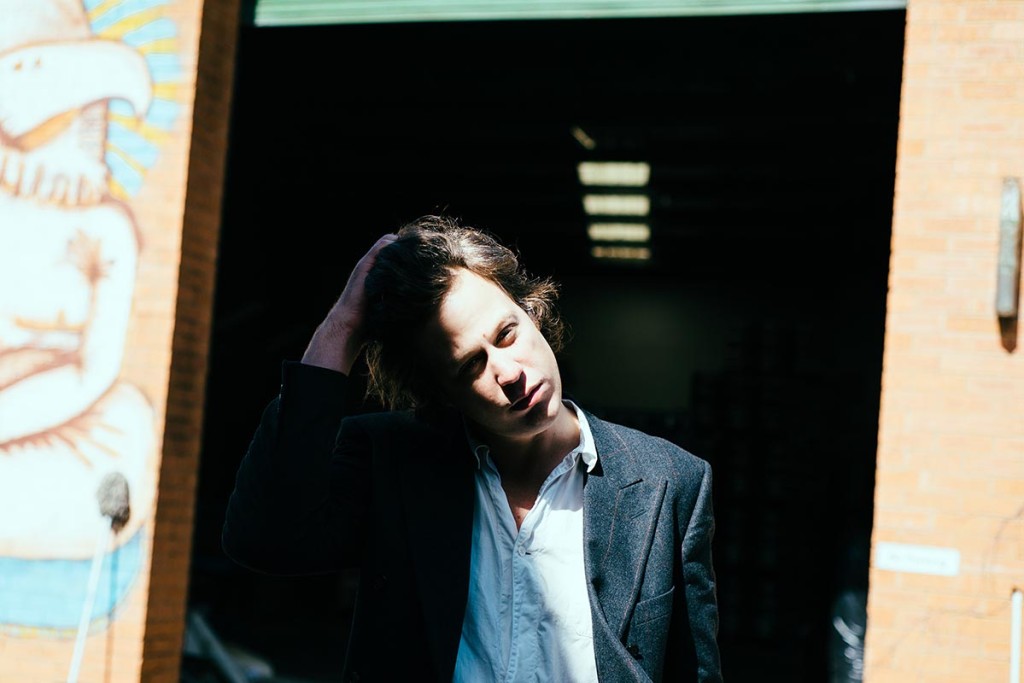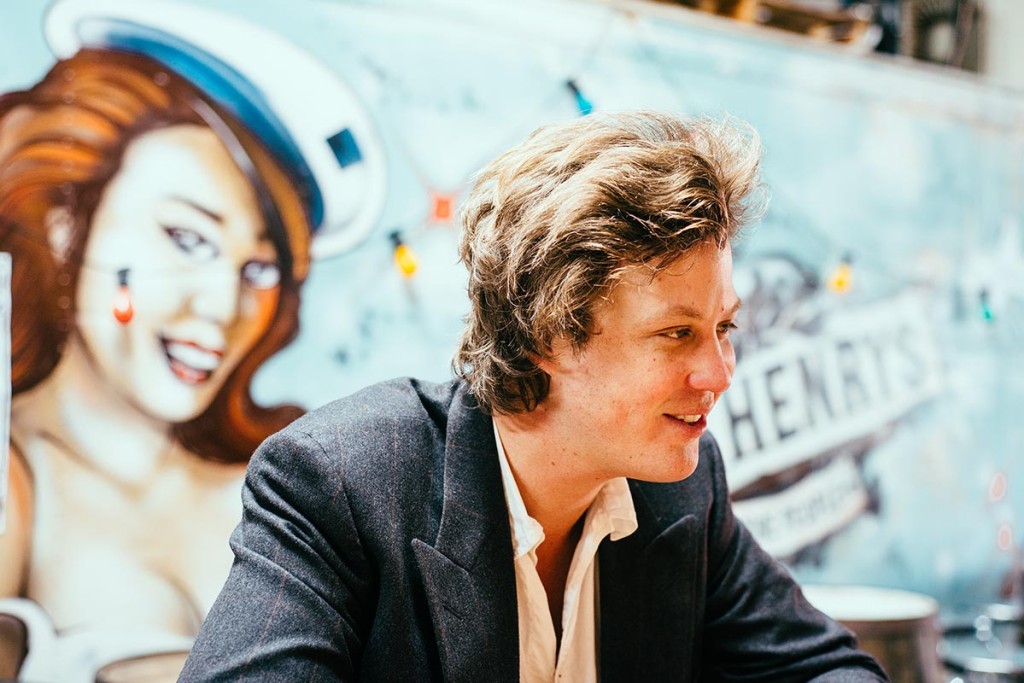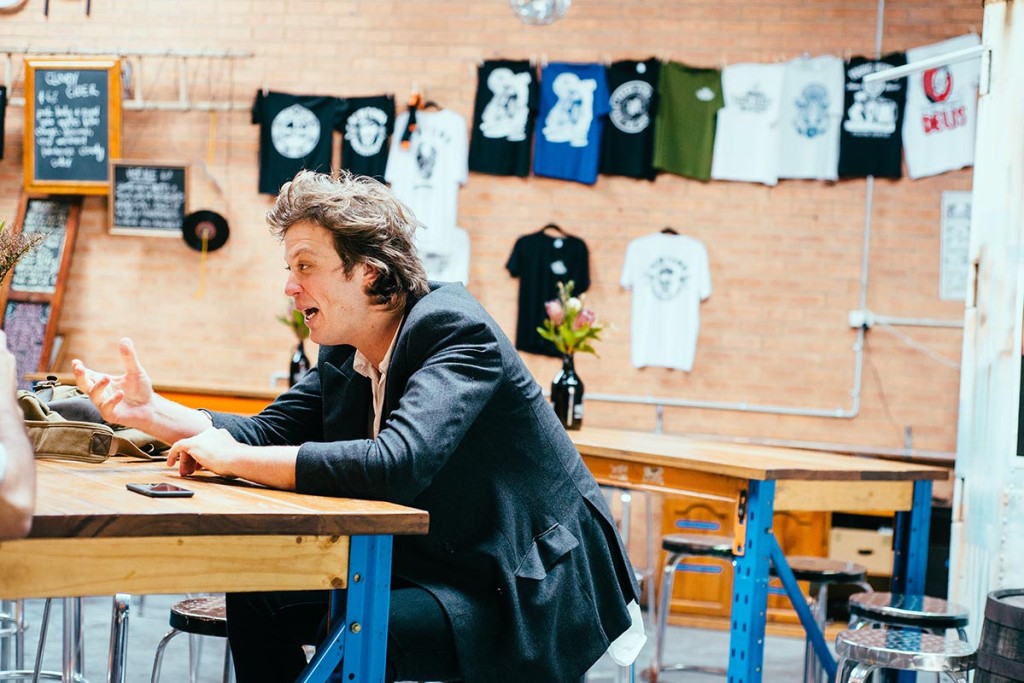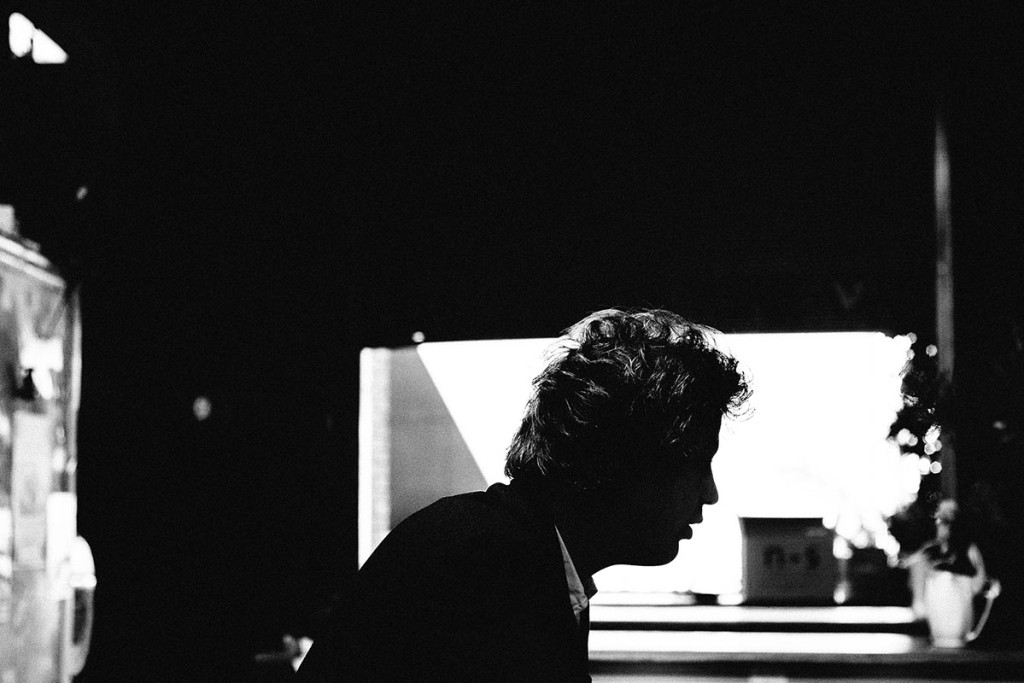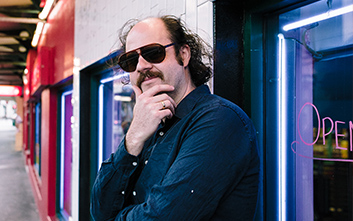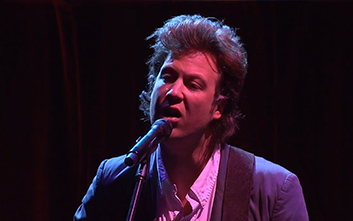With his imposing figure and slick baritone voice Jack Ladder can be an intimidating person in the flesh, but the man behind the curtain, Tim Rogers, is just an ordinary guy who likes his chickens, playing in a band he likens to the Ninja Turtles and seeks to evolve his songwriting. As we sit down at Young Henry’s it’s only appropriate we start discussing beer.
Photos by Liam Cameron
HAPPY: Are you much of a beer connoisseur?
TIM: No, not really. I much rather my simple beers. I’m not a hoppy kind of guy, more like a simple lager. I’m more of a red wine person, but I’m not that picky about the red wine either (laughs). When you’re a musician you can’t be too picky, you drink what you’re given. I know a good one from a bad one, but you just drink it anyway.
HAPPY: Did you sample anything good when you were over in the States?
TIM: Hmmm, no. Just a lot of cheap Mexican beer. The drinking culture there is pretty full on in terms of drinking tequila shots with every drink. You go to a bar in LA called The Gold Room, it’s like a Mexican dive bar. For five bucks you get a beer and a tequila shot, so things can get really heavy really quickly.
HAPPY: How was the tour? The band played eleven gigs and four radio broadcasts in twelve days. That seems insane.
TIM: I’ve been to America before but I’ve never really toured. I think a normal tour would be easier to manage when you’re playing a different city every night, then having a day off. Doing SXSW, we did like eight shows in three days. They’re only half hour sets but there’s a lot of packing up and setting up. Just getting mentally prepared to play and then cooling off after playing. I’ve never done that three times in a day before, it’s a pretty draining exercise. Then going from that to New York and having to deal with the transition in temperature because it was freezing, and also being exhausted from SXSW. By the end of the trip my face was sort of falling off. But we got through it. I think people liked the band, they were understanding of what we were trying to do. We’re kind of outside of what’s going on in America. We’re doing a tour here and it’s two weeks; two weekends and we do four dates. That’s it. After doing eight shows in three days you’re like “That’s nothing“. But it’s a different kind of thing I guess.
HAPPY: You say people were accepting of the band doing something different. Were you aware of that going into the shows?
TIM: We can only do what we do. To us it’s a very normal thing to do, and when you’re confronted with playing with a lot of other bands who are on a different trajectory you start going “Oh, what we’re doing is a little more left of field“. We’re coming at it from a different angle in terms of the sounds that we’re using and the personalities in the band. I think in Sydney it’s kind of funny because people know who Kirin is, people know Donny, people know Laurence. But you go to America and watch a band with those kinds of personalities on stage all doing their own thing at the same time, they don’t know where it’s coming from. They don’t know Donny’s story, they don’t know Kirin’s story. We were playing to a lot of people who hadn’t heard of Kirin before so it’s just like so much information to take in at once. It’s exciting. I think because we’re older guys as well, we’re not early twenties kids. I mean Donny’s a man y’know? (laughs). He’s a real man. Somehow along the way I became a man. Kirin is still figuring it out.
HAPPY: The personalities within the band really draws you to The Dreamlanders. Your chemistry together feels so natural, was it always like that?
TIM: Well there’s been a lot of patience involved and we’ve known each other for a really long time. I met Laurence first, and I’d grown up really liking PVT and Trisok, another band he was in with Donny. And Laurence asked me if I needed a drummer to give him a call. I’d only been playing solo at that point, and then I was booked to open for Sarah Blasko for an Australian tour. So I asked Laurence if he would do it and that was in 2006. At that point Steffen from Decoder Ring was playing bass and he couldn’t do some shows, and Laurence said “Maybe you should get Donny“. At this point Donny wasn’t the Donny we know, he was sort of forming the Donny he would become. He was a very different kind of guy. He used to sit down on a stool and play his bass. It was a much more serious, heavy character. He didn’t have his hair at the back, but he was a serious musician. We played for a couple of years and did a record.
Kirin opened for us one night at the Hopetun, and we were all a bit like “Uhhhhh, who’s that guy?“. Kirin had just split with Mercy Arms and we liked what he was about. I broke my arm after that and we had a tour booked of Australia, our first big national run and we needed another a guitar player to flesh it out. So we asked Kirin, but Kirin can only do what Kirin does. The music we were playing was much more RnB, jazz inspired stuff. We kind of adapted to each other and reinvented the songs for that tour, and that became where we’re at now. We all changed each other a bit. Donny became Donny after bouncing off Kirin. But we haven’t played together since after Hurtsville came out, things went a bit pear shaped. There were business problems, Laurence and Donny couldn’t do those shows so Kirin and I played with other makeshift bands and nothing really gelled. The first show we did together in 2013 when we played in Byron Bay and that’s kind of how the new album started. That’s where we met Sharon Von Etten, and everything started to gel again.
HAPPY: So what’s it like having all these characters…
TIM: Up in my grill? (laughs) It’s really great. I guess the way I started was as a songwriter, and there’s a certain stigma and loneliness with that. Then I got used to having a band, and now the band itself, I just feel like I’m the singer in the band even though I’m sort of responsible for presenting what we do and writing music. When we’re on tour I feel like a guy who’s fronting a band as opposed to being ‘the’ guy and having my band. Because I think a lot of songwriters think it’s like “I’m the boss and everyone else is my underling“, whereas these guys, it’s not like they take control, but that we’re all on the same team, and everyone is themselves, which is kind of a weird scenario for a songwriter. As opposed to me and minions, it’s me and him and him and him. I think there’s a mutual respect and the sort of music we make is quite particular in a certain sense of playfulness and seriousness.
The music can be quite simple to play, when you look at it on paper it’s just one chord or three chord folk songs, but if you don’t play it with the right kind of emotional way or sense of space or confidence, then it can really fall on its ass and lack the sense of purpose or strength that you need to perform it. That’s what the band is about in a lot of ways. Confidence. Sort of standing there saying things that aren’t necessarily being dealt with in that context. The nature of my voice is that it everyone hears everything I say. In some bands you have some bad lyrics or say something really offensive. You can say it under your breath and it fits into the melody, everyone would be like “What’s he saying? I love this song!“. Whereas with me when I sing a song if I make a false move everyone knows. If I mess up a word everyone knows and people call me out on it. You can’t do it half assed, so when you do it you need to have the proper team surrounding you so it won’t come out half baked.
HAPPY: So having the band has made you evolve your craft as well?
TIM: Definitely. I think we’ve all helped each other in certain ways. I think four guys, a bunch of freaks. The personalities are kinda funny, like Teenage Mutant Ninja Turtles. It does have that kind of dynamic. You’ve got the serious guy, and the party animal, the scientist.
HAPPY: Who’s who?
JACK: Well it changes. Donny is Donatello (laughs). I think they all have the ability to be all of the Ninja Turtles at different times, maybe that’s why it works. They keep changing their roles. I don’t often get to be Michelangelo, I’m sort of stuck in the Master Splinter role (laughs).
HAPPY: As long as no one is Shredder.
TIM: Yeah, not yet. I’ve met a few Shredders. Shredders are the nemesis (laughs).
HAPPY: Would you say you have nemesis’?
TIM: Not that I know. I like to keep things civil. Although I think people need to be called out when they’re doing bad stuff.
HAPPY: Do you ever find yourself getting called out on stuff?
TIM: I get called out a fair bit. For lyrics, or being accused of misogyny, culturally insensitive statements. But I guess because as a songwriter you’re inspired to do certain things and sometimes you don’t think about it. The idea comes to you fully formed and you’re just a mouthpiece for that idea. I’m learning to control it a bit better. Fact checking. Sometimes if you talk about things that are real in songs and you don’t get the terminology right it can be embarrassing. Being called out on that stuff is pretty terrifying (laughs). Just because I’ve put this idea out in the world and I’ve been fundamentally wrong.
There was this one thing, I wrote this song called Three Stomachs, No Weekend, and in my mind I had this idea of a cow with three stomachs. A cow has four stomachs, and I liked the way three stomachs sounded compared to four, even though I liked how it sounded better with four. I left it with threes stomachs, and it’s embarrassing. It’s my work that exists in the world. But there needs to be leeway for those kinds of things as well because you’re dealing with poetics and language, and words. Basically you want to get it right the first time (laughs).
HAPPY: But being more conscious of that does that hinder your creative process?
TIM: Well it’s not very fun to check facts when you’re just trying to be creative. It’s hard to say where songs come from. They start as a primitive grunt, sometimes they have some words and you’re building something out of nothing. You’re drawing these things out and they make sense in context of that thing but someone else might hear it and will be entirely different to them and trigger something that’s happened in their life. I guess that’s why music is subjective and appealing to certain songs that have an openness to them are enjoyed by so many people. Everyone has their own experiences and are able to enjoy it differently. Everyone comes at it with their own experience and if your song transcends that you can connect at that one point. I’m not sure if that makes any sense.
HAPPY: Well what you’re saying is everyone is on their own plane and they’ll intersect with others as they see fit.
TIM: Yeah. You’re writing songs about personal experiences, it’s hard to expect anyone to have had the exact same experience as you. So when you’re writing songs, these vague terms, cliches and all these types of language devices that you build into the songs to communicate certain emotions that allows everyone else to tap into that and feel the singularity of that story and take away from it a unified sense in everyone’s differences. (laughs) I know it’s a lot simpler than that.
HAPPY: Well that’s a pretty interesting way to look at it. That being said I’ll have to ask our last question. At Happy we love writing about great music that makes us happy, so I want to know Tim, what makes you Happy?
TIM: What makes me happy? I like doing my work. I’ve been accused of being a workaholic, but when you’re life is essentially doing what makes you happy then it’s okay. I love making music and writing and performing. Creating artwork and so as long as I can do that I’m happy. I think when I don’t get to do that I’m unhappy. I like being at my home with my chickens. Fresh eggs in the mornings make me happy, straight out of the chicken! Strong coffee makes me happy.
And other people’s music. Other people’s art, other people’s lives and stories that’s about it. Beautiful instruments make me happy. The effects of sounds and hearing things for the first time. The point when something comes into realisation. That point where “This thing didn’t exist before and now it’s here in my head“, that’s the most addictive thing to making music. That’s kind of what happiness is, it’s addictive. When you find that thing you want to keep doing it. But does that always make you happy? Is being an addict happiness? Happiness is kind of dangerous in a way, it makes you passive if you’re happy all the time. So in that way happiness isn’t that important to me (laughs).

